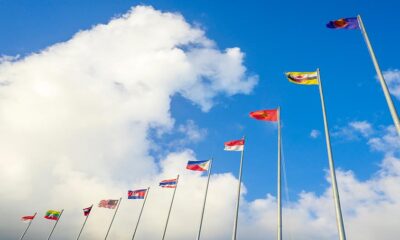China
Third Quarter 2023 Asia Transfer Pricing Brief

The Q3 2023 Asia Transfer Pricing Brief highlights Singapore’s proposal to implement the global minimum tax, Malaysia’s new transfer pricing rules, and India’s signing of 95 Advance Pricing Agreements. Asia’s emerging markets continue to attract multinational enterprises, making transfer pricing an important issue. It involves pricing arrangements between associated enterprises in different tax jurisdictions, requiring adherence to the “arm’s length standard” in line with international regulations.
In our first Asia Transfer Pricing Brief for Q3 2023, we provide the latest transfer pricing updates from Asia countries. Singapore proposes the implementation of the global minimum tax starting from January 1, 2025. Malaysia introduced new transfer pricing rules that will be effective for the year of assessment (YA) 2023 and onwards. India announced a landmark achievement, with the signing of 95 Advance Pricing Agreements in the fiscal year 2022-23.
Asia remains one of the world’s primary investment hubs, attracting an increasing number of businesses that have either expanded or are contemplating expansion into its high-performing emerging markets. For multinational enterprises (MNEs), transfer pricing is an important issue that demands attention sooner or later.
Transfer pricing concerns the pricing arrangements between associated enterprises (AE) operating in different tax jurisdictions for their intercompany transactions. In alignment with international regulations, Asian taxpayers engaged in transactions with other group entities must substantiate that these dealings adhere to the “arm’s length standard.” This standard necessitates taxpayers to prove that their transactions with related parties mirror those with third parties in a similar manner and under comparable conditions.
This article is republished from China Briefing. Read the rest of the original article.
China Briefing is written and produced by Dezan Shira & Associates. The practice assists foreign investors into China and has done since 1992 through offices in Beijing, Tianjin, Dalian, Qingdao, Shanghai, Hangzhou, Ningbo, Suzhou, Guangzhou, Dongguan, Zhongshan, Shenzhen, and Hong Kong. Please contact the firm for assistance in China at china@dezshira.com.
Business
Business Update: Southern Sun Reports Earnings Growth; China Stimulates Property Market – News24

Southern Sun reports increased earnings, attributed to growth in the hospitality sector, while China’s property market receives a boost, reflecting economic recovery and renewed investor confidence.
Southern Sun Earnings Surge
Southern Sun has reported a significant increase in its earnings, showcasing solid financial performance amid evolving market conditions. This growth highlights the company’s resilience and adaptability to changing consumer demands, positioning it well for future opportunities in the hospitality industry.
China’s Property Market Recovery
In a bid to rejuvenate its economy, China has introduced measures to boost its property market. These initiatives aim to stabilize real estate prices and encourage investment, which is crucial for maintaining economic momentum. The government’s commitment to supporting the sector reflects its understanding of the industry’s importance in overall economic health.
Broader Economic Implications
The rise in Southern Sun’s earnings and China’s proactive approach to revitalizing its property market indicate broader economic trends. Investors and stakeholders are keenly observing these developments, as they may signal recovery and growth opportunities in both the hospitality and real estate sectors. The collaboration between local businesses and governmental actions will be pivotal in shaping future economic landscapes.
Source : Business brief | Southern Sun sees earnings rise; China boosts its property market – News24
China
Vietnam’s Approach to China: A Balance of Cooperation and Struggle
Vietnam’s diplomatic strategy seeks a balance of cooperation and struggle with China, focusing on strengthening ties while resisting encroachments in the South China Sea through military enhancements and regional partnerships.
Vietnam’s Diplomatic Strategy
Vietnam’s diplomatic approach seeks to maintain a delicate balance between cooperation and struggle with China. While concerned about China’s growing influence, particularly in the South China Sea, Hanoi focuses on strengthening its economic and political ties. This effort involves military enhancements, fostering relationships with regional powers, and engaging in frequent political dialogues. By skillfully navigating relations with major powers, Vietnam aims to protect its sovereignty and foster stability amidst evolving geopolitical dynamics.
Recent Developments and Implications
Hanoi’s diplomatic maneuvering has drawn attention, particularly regarding key visits like Vietnamese Communist Party General Secretary To Lam’s August 2024 trip to China. Although there are apprehensions about a potential shift in Vietnam’s alignment due to To Lam’s background in public security and his anti-corruption initiatives, it is premature to predict any significant changes in policy. Vietnam’s leaders must continuously seek a balance between peaceful coexistence with China and safeguarding national sovereignty.
Economic Interdependence and Military Modernization
Vietnam’s strategy involves fostering economic interdependence with China while simultaneously resisting encroachments. This paradigm of “cooperation and struggle” enables Hanoi to cultivate beneficial ties in economic, political, and security domains. By leveraging its geographical advantage and connections, Vietnam enhances its economic ties while countering threats through military modernization and cooperation with regional partners. This nuanced approach allows Vietnam to welcome trade, particularly amidst shifting dynamics from the US-China trade war, ensuring continued foreign direct investment and growth in key sectors.
Source : Cooperation and struggle define Vietnam’s approach to China
China
2025 Schedule of Public Holidays in China

China’s 2025 public holiday schedule increases holidays by two days, with an 8-day Spring Festival and a 5-day Labor Day. Adjustments address public frustration, though long work periods persist. Notably, weekends are often designated as workdays to balance extended breaks.
China has released its 2025 Public Holiday schedule. Compared to 2024, the number of public holidays for all citizens has increased by two days, specifically for Lunar New Year’s Eve and May 2nd.
The announcement also clarifies the adjusted holiday arrangements, stating that the continuous work period before and after statutory holidays generally should not exceed six days, except for certain special circumstances.
According to the notice, in 2025, the Spring Festival will have an 8-day holiday, the Labor Day holiday will last 5 days, and the National Day and Mid-Autumn Festival will jointly have 8 days off.
China has long been considered one of the least generous countries in terms of public holidays. Additionally, people have expressed frustration over the complicated adjustments to holiday and working days that are meant to create longer breaks. The newly introduced changes are expected to address these concerns to some extent.
Beyond the newly introduced changes, China’s 2025 public holiday schedule still features two major week-long holidays: Spring Festival (also known as Chinese New Year) and the National Day holiday (often called ‘Golden Week’).
In 2025, the Spring Festival falls between January 28 and February 4, and the National Day holiday, together with the Mid-Autumn Festival, fall between October 1 and 8.
Foreign human resource managers should note that Saturdays and Sundays are often marked as additional official workdays in China to compensate for long holiday breaks. For example, January 26 (Sunday) and February 8 (Saturday) are designated as workdays to partially offset the eight days off for the Spring Festival.
| This article was first published by China Briefing , which is produced by Dezan Shira & Associates. The firm assists foreign investors throughout Asia from offices across the world, including in in China, Hong Kong, Vietnam, Singapore, and India . Readers may write to info@dezshira.com for more support. |
Read the rest of the original article.










